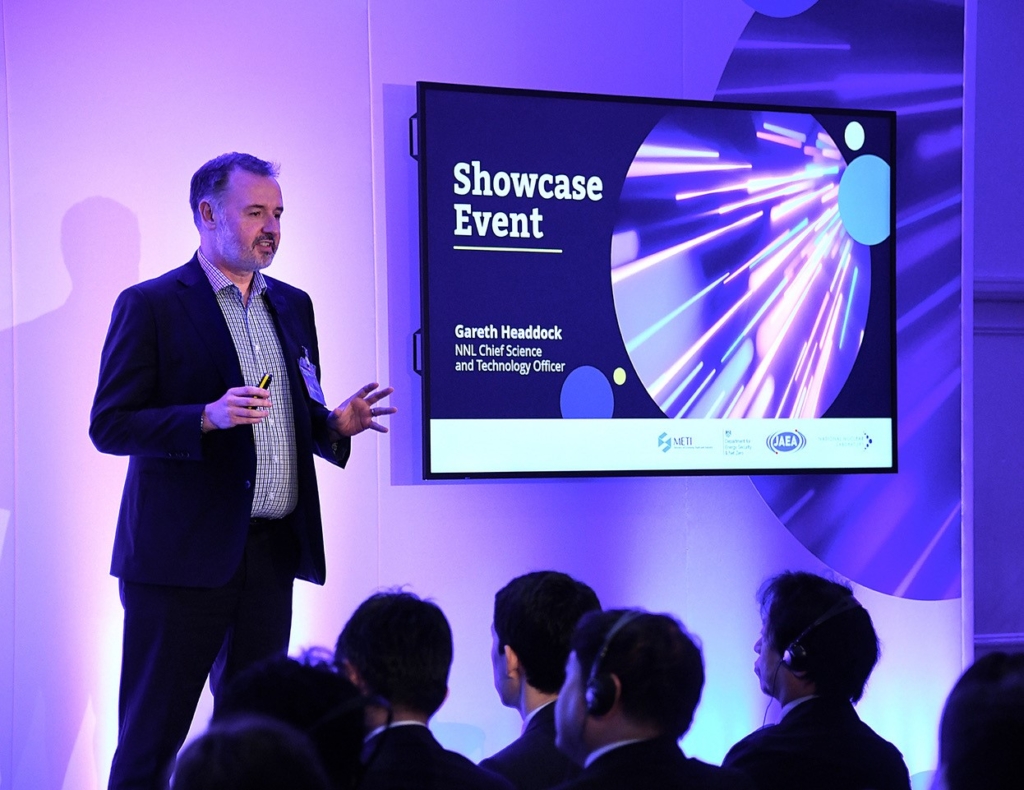Friday 6 December 2024
Showcase Event Highlights UK-Japan Collaboration on Nuclear
Last month, NNL hosted a two-day showcase event, highlighting the achievements of two projects that the UK and Japan have worked closely together on; the UK Coated Particle Fuel (CPF) – Step 1 Programme and the Advanced Modular Reactor (AMR) Research, Development & Demonstration (RD&D) Phase B Programmes, both of which have received funding from Department for Energy Security and Net Zero (DESNZ).
The event brought together experts from both countries across government, industry and academia to explore the potential of High Temperature Gas-cooled Reactor (HTGR) technology. It focused on fuel development on day one and reactor systems on day two. Both programmes demonstrate the growing interest in advanced nuclear technology and the strong collaboration between NNL and colleagues at the Japanese Atomic Energy Agency (JAEA).






NNL Chief Executive Paul Howarth opened the event by reflecting on his long-standing involvement with advanced reactor programmes. He emphasised the game-changing potential of AMRs in the energy system and the crucial role of nuclear power in achieving net zero goals. He also highlighted the close collaboration with Japan on this project and his own personal links with Japan, which go back decades.
Day One of the showcase focused on fuel technology, particularly the development of TRi-structural ISOtropic (TRISO) CPF for high-temperature reactors. DESNZ emphasised the importance of upskilling the next generation of nuclear experts and providing a sovereign source of nuclear fuel. JAEA expressed gratitude for the collaboration with NNL on this programme and highlighted Japan’s renewed focus on nuclear energy as part of its green transformation policy.
Technical demonstrations from NNL colleagues involved in the UK CPF Programme were very popular and gave some of our early careers colleagues the opportunity to showcase the work of the laboratory. Afternoon sessions included presentations from across the nuclear supply chain including Urenco and Westinghouse, with a focus on skills development from the Dalton Institute and a summary of the social value programme that has been delivered.
Day two shifted the focus to reactor systems, where the potential applications of AMRs including decarbonising industries, producing synthetic aviation fuels, and generating hydrogen were highlighted by a number of speakers.
DESNZ provided an update on the UK’s nuclear strategy and where this work sat within the overall nuclear policy. The Japanese Ministry of Economy, Trade and Industry (METI) also updated delegates about Japan’s ambitious goal of achieving carbon neutrality by 2050 and their significant investment in nuclear technology, including a 1 trillion Japanese Yen commitment over ten years.
Throughout the event, which included more technical demonstrations from experts, speakers emphasised the unique advantages of HTGRs, particularly their ability to provide high-temperature heat for industrial processes. The UK government recognises this potential and aims to develop an HTGR demonstrator by the early 2030s.
Of course, there needs to be a demand for this heat, and Heidelberg Materials UK identified a need for hydrogen to decarbonise their processes, having assessed that electrification isn’t suitable.
NNL Chief Strategy Officer Emma Kelly concluded the event by highlighting the fundamental importance of collaboration across international borders, government, industry, and academia. She praised the progress made in both programmes and emphasised the urgency of moving forward at pace to deploy these technologies and support the UK’s transition to net-zero by 2050.
The AMR Showcase demonstrated the UK’s commitment to developing advanced nuclear technologies as part of its strategy to achieve energy security and meet climate goals. By fostering close collaboration with Japan and leveraging the expertise of both nations, the UK is well-positioned to accelerate the deployment of HTGR technology and play a leading role in the future of nuclear energy.
NNL’s purpose is nuclear science to benefit society. As the nuclear sector continues to evolve, events like this play a crucial role in bringing together scientists at the cutting edge of nuclear technology to share knowledge, develop closer relationships and drive innovation to improve people’s lives.
With the potential to create jobs, support supply chains, and provide opportunities for high-value exports, the development of AMR technology represents a significant opportunity for the UK to establish itself as a green energy superpower on the global stage.
